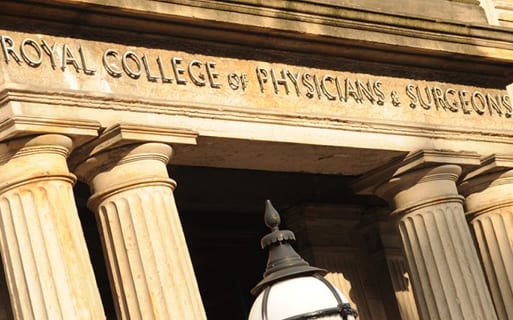Physician Associates in UK healthcare
01 Mar 2024
The Royal College of Physicians and Surgeons of Glasgow sets out its position on the development of the Physician Associate role in the UK

There has been much discussion in healthcare, and within the media, on the development of the Medical Associate Professionals (MAPs) workforce, and in particular, the role of the physician associate (PA).
Physician associate roles have been, to date, based on local need, meaning there is currently no standardisation or national guidance on the scope of practice, and no nationally-accepted training standards or assessment for the role.
With numbers of PA roles expected to grow significantly under the NHS Long-Term Workforce Plan in England, and discussions ongoing in other parts of the UK, further guidance is required to maintain the highest standards of patient care and safety. More clarity is also needed on how the role of the physician associate should integrate with the wider healthcare team.
As a multidisciplinary Royal College, we value the positive contribution of all members of healthcare teams in providing high quality care. We recognise that effective teams have a shared understanding of roles and responsibilities at their heart.
We are concerned that nationally, the physician associate role is not well-defined, and is therefore not well-understood by the wider healthcare team, by patients or their families.
The role, education, training and assessment of doctors and physician associates are very different. It is important to be clear that physician associates are not doctors, and should not be used to substitute doctors; they are valued members of the wider healthcare team.
In order to implement a well-defined framework for quality management, training and scope, we note:
- While independent regulation of the physician associate profession is a welcome, and necessary, step, we remain concerned that the choice of the doctors’ regulator – the GMC – has potential to further blur boundaries between medical practitioner and MAP roles. However, if the GMC is to be the regulator, there must be clear differentiation between the two registers to avoid confusion.
- All healthcare professionals should clearly explain their role to patients and their families.
- Some countries, notably the United States, have had similar roles – physicians assistants – in place for some years. However, the unique nature of the NHS means more consideration is required into how the physician associate role will integrate with healthcare teams in the UK.
- It is vital that physician associates are provided with supervision of clinical practice to ensure high levels of care and patient safety. Before creating new roles, careful planning and discussion is essential to ensure supervising doctors are given enough time within job plans to support this. This will be particularly challenging amid current workload pressures, and further consideration is vital.
- Availability of supervision is also critical because physician associates are unable to prescribe drugs or request radiology investigations. Supervising doctors, who carry legal responsibilities, cannot countersign these without having assurance that they are appropriate and in line with best practice.
- Physician associates, and other medical associate professionals, work alongside doctors in training in a complementary way, but do not replace them. Physician associates should not be used as substitutes for doctors in training on shared rotas.
- Care must be taken to avoid unintended consequences when expanding any area of the workforce nationally: the healthcare team is complex and interconnected, and it is essential that there is enough support available for all members of the team. This includes ensuring there is no negative impact on access to training opportunities for other groups, including doctors in training, which are essential if doctors are to achieve specific competencies, specialise, and progress in their careers. Without adequate training opportunities, we will not have the consultants of the future.
We are aware that there have been conflicting views among the healthcare community on the development of MAP roles, and we encourage an open, constructive and continuing dialogue. As a Royal College, we are a member of a task and finish group established by the Intercollegiate Extended Surgical Team Board, to address the gap in guidance for physician associates and other roles in the extended surgical team. This group is working to determine the scope of practice, training, assessment and governance arrangements for all members of the extended surgical team, and how this relates to surgical training.
This group includes members from the surgical royal colleges, surgical specialty associations, surgical trainee associations and organisations representing the non-medical professions within the surgical team. It aims to publish its recommendations early this year.
More work is required to discuss the role of the physician associate in medicine. It is essential that the discussion includes members of the medical associate professions, royal colleges (including all physicians’ and surgeons’ colleges), specialty associations, and doctors in training representatives, to fully realise the potential of physician associates, to maintain patient safety and high-quality care, and to ensure the trust and confidence of patients and their families.
Category: Workforce
Latest news and statements
Key priority areas
Topics
- Workforce
- Wellbeing
- Equality, Diversity and Inclusion
- Climate Change
- Health Inequalities
- College
- Obesity
- COVID-19
Archive
Key links
Tweets by @rcpsglasgow